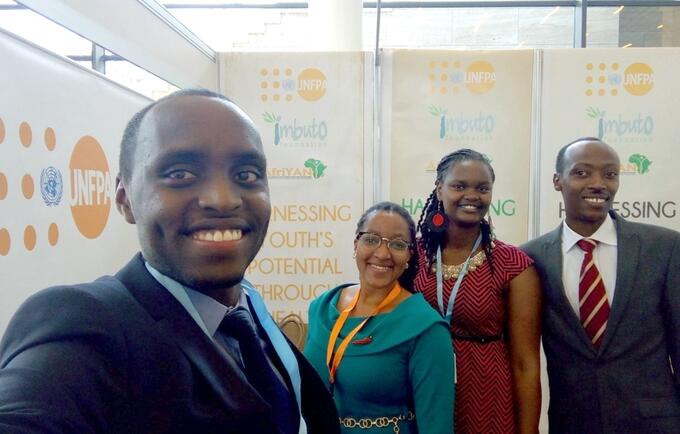Harnessing youth potential through health is critical to Africa’s demographic dividend
This will only happen if investments are made in youth.
The returns on investment in young people, particularly young women and adolescent girls, can be enormous, with the potential to catapult developing economies forward and eliminate extreme poverty.
For the first time ever at a Youth Connekt summit, UNFPA organized a special event on harnessing the youth potential through health, at the Youth Connekt Africa summit in Kigali, Rwanda. The aim was to advocate for investments in the health of young people, especially adolescent girls and young women.
Help girls and young women to build capacity, seize opportunities and enjoy rights
Prioritizing human capital development, including empowering women and girls to be able to exercise their rights, and expanding quality health and education systems, is key to harnessing the demographic dividend.
It was agreed at the event that for inclusive economic growth and sustainable development on the continent, issues affecting young people must be addressed. Specifically, young women and adolescent girls face more obstacles than young men and boys in building their capabilities, seizing opportunities and enjoying their rights.

“Prioritizing human capital development, including empowering women and girls to be able to exercise their rights, and expanding quality health and education systems, is key to harnessing the demographic dividend,” said Mark Bryan Schreiner, UNFPA Representative for Rwanda.
The African Union’s theme for 2017 is ‘Harnessing the Demographic Dividend through Investments in Youth’. Member states have agreed to the centrality of the demographic dividend to Africa’s transformative development. UNFPA, in collaboration with other partners, supported the development of the AU Road Map on Harnessing the Demographic Dividend through Investments in Youth.
However, a successful demographic transition can only take place if young girls and women are empowered through education and provided the right information on sexual and reproductive health issues, so they can make the right choices.
Youth showcase empowering UNFPA-supported initiatives
Realizing the potential of young people to contribute to the economic growth and development of Africa, UNFPA has supported the AU to undertake a comprehensive assessment of young people on the continent.

The Fund works with youth organizations and supported the formation of the African Youth and Adolescents Network on Population and Development (AfriYAN), which provides opportunities for young people to advocate for population and development issues. UNFPA also supports the Innovation Accelerator (iAccelerator) and Youth Enterprise Model (YEM), which advocate for and tap into the creativity and innovation of young people in a bid to create decent employment and promote entrepreneurship.
During a session on the Sustainable Development Goals (SDGs), a young person from Uganda presented on YEM, which focuses on the use of ICT as a driving force in increasing access to sexual and reproductive health (SRH) and contraceptive use among adolescents and youth. In addition, one of the winners of the iAccelerator programme, which encourages young people to think critically and creatively about issues related to SRH, presented her innovative idea of empowering women to access SRH information.
Mr. Schreiner urged national authorities and development partners to prioritize investments in their youth, especially adolescent girls and young women, so that Africa can achieve a demographic dividend. Investments are needed in policies and programmes that harness the potential of young people and ensure they are healthy, educated and gainfully employed.
The event was attended by high-level officials from Africa, including Rwandan Minister of State Dr. Patrick Ndimubanzi, Zambian Minister of Youth and Sports Moses Mawere, the Head of the African Union’s Youth Division, as well as ambassadors, UN agency representatives, young people and youth-led organizations from Africa.


